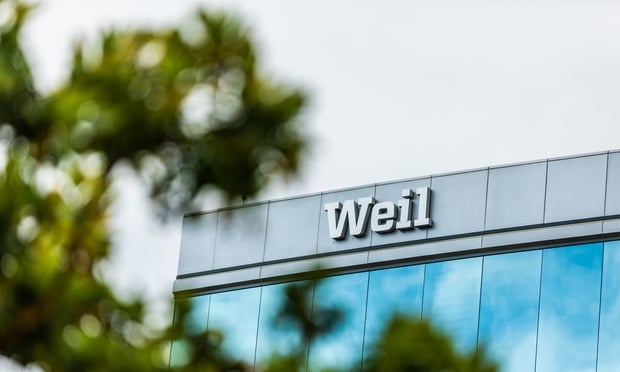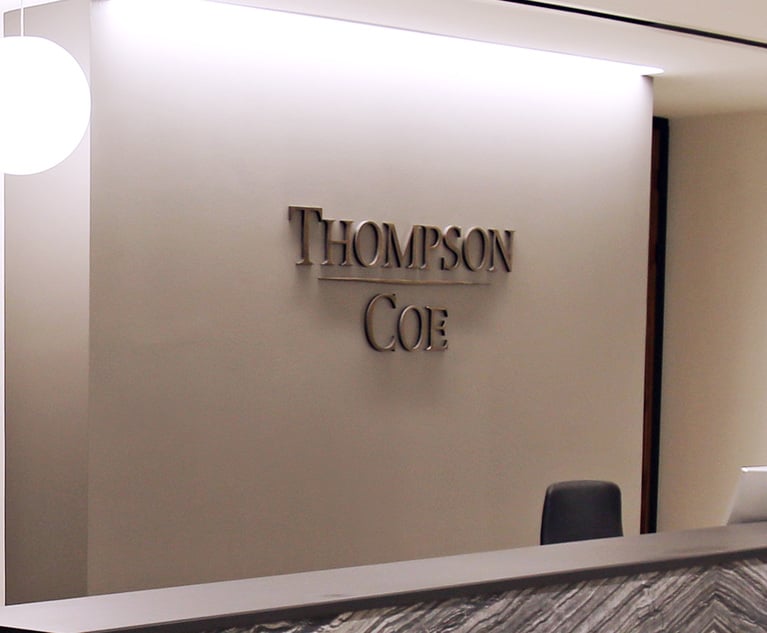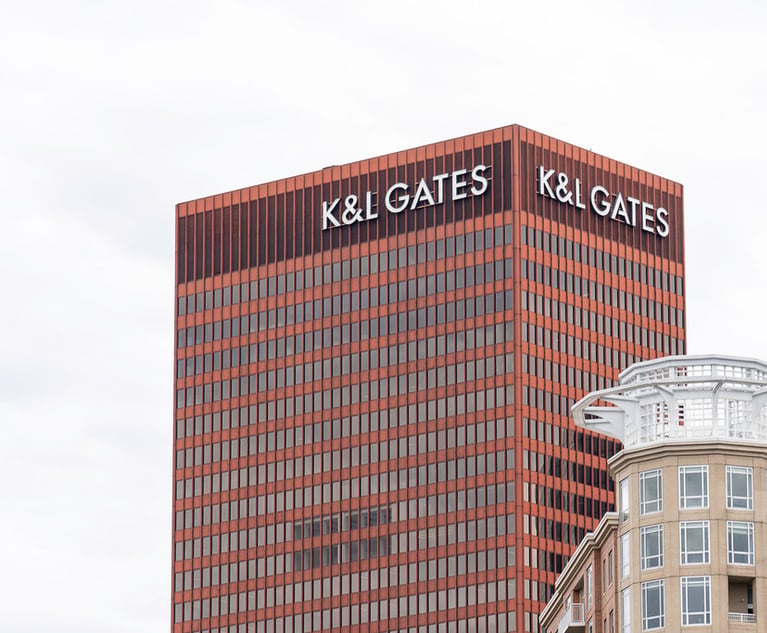Weil Donates $1.5M From Pro Bono Win to Benefit Mexican-Americans
"It's not just about writing checks or taking on matters," executive partner Barry Wolf said of the firm's approach to pro bono.
September 20, 2019 at 06:18 PM
3 minute read
 Photo: Jason Doiy/ALM
Photo: Jason Doiy/ALM
Six nonprofit groups will split $1.495 million in attorney fees stemming from a Weil, Gotshal & Manges pro bono victory, the firm said, with the money going to support legal education and other causes for Mexican Americans.
Weil won the fee award in 2017 after successfully challenging an Arizona state statute that would have eliminated Mexican American studies courses in Tuscon public schools. The firm is donating the funds to The Innocence Project, The National Latino Education Research and Policy Project, The Seattle University School of Law Fred T. Korematsu Center for Law and Equality, The University of Arizona's Center for the Studies of Higher Education "Semillas del Pueblo" program, and the University of Colorado Law School Leaders in Law and Community program.
In an interview, Barry Wolf, Weil's executive partner and chair of the firm's management committee, said its pro bono and philanthropy committees worked together to decide how the financial windfall from the Arizona case could have the most positive impact. Since the case involved the education and civil rights of Mexican Americans, he said the firm always intended to use the money to support similar issues affecting the Mexican American community.
"One of the elements of our culture is giving back," he said. "We wanted to be strategic [with the donations] so they could have the maximum impact possible."
In the months following the case, Wolf said the two committees established a closed process in which various nonprofits were invited to submit proposals for how they would use a donation to benefit the Mexican American community.
"We wanted to contribute the money back to the issues coming up in this particular matter— Mexican American education and legal justice," he said. We thought it was appropriate, since the fees were awarded in a civil rights case involving Mexican Americans, we wanted to support causes related to that."
According to the firm, the six organizations chosen "are focused on cultivating the next generation of ethnic studies educators and civil rights advocates, as well as furthering policy and research, with emphasis on the Mexican-American community." Weil has dispersed all of the charitable contributions.
- Equal Justice Works will use $250,000 to create two, two-year fellowships to focus on civil legal needs of Mexican Americans and support a pipeline for Mexican American law students to become public interest leaders.
- The Innocent Project will use $250,000 to represent clients in the Mexican American community.
- The National Latino Education Research and Policy Project will use $195,000 to develop a middle school curriculum focused on Mexican American studies and inclusivity of marginalized populations.
- The Seattle University School of Law Fred T. Korematsu Center for Law and Equality will use $150,000 to create fellowships that advance social justice for members of disempowered communities.
- The University of Arizona's Center for the Study of Higher Education "Semillas del Pueblo" program will use $400,000 to support Mexican American studies teachers.
- The University of Colorado Law School Leaders in Law and Community program will use $250,000 to recruit and support law students with a connection to the Mexican American community.
A federal judge in the District of Arizona ruled in 2017 that Tuscon public school officials were motivated by racial animus in their decision to end Mexican American studies programs in their schools. Weil, led by partner Steven Reiss and retired partner Jim Quinn, represented the plaintiffs.
This content has been archived. It is available through our partners, LexisNexis® and Bloomberg Law.
To view this content, please continue to their sites.
Not a Lexis Subscriber?
Subscribe Now
Not a Bloomberg Law Subscriber?
Subscribe Now
NOT FOR REPRINT
© 2025 ALM Global, LLC, All Rights Reserved. Request academic re-use from www.copyright.com. All other uses, submit a request to [email protected]. For more information visit Asset & Logo Licensing.
You Might Like
View All


K&L Gates Sheds Space, but Will Stay in Flagship Pittsburgh Office After Lease Renewal

Trending Stories
- 1'It's Not Going to Be Pretty': PayPal, Capital One Face Novel Class Actions Over 'Poaching' Commissions Owed Influencers
- 211th Circuit Rejects Trump's Emergency Request as DOJ Prepares to Release Special Counsel's Final Report
- 3Supreme Court Takes Up Challenge to ACA Task Force
- 4'Tragedy of Unspeakable Proportions:' Could Edison, DWP, Face Lawsuits Over LA Wildfires?
- 5Meta Pulls Plug on DEI Programs
Who Got The Work
Michael G. Bongiorno, Andrew Scott Dulberg and Elizabeth E. Driscoll from Wilmer Cutler Pickering Hale and Dorr have stepped in to represent Symbotic Inc., an A.I.-enabled technology platform that focuses on increasing supply chain efficiency, and other defendants in a pending shareholder derivative lawsuit. The case, filed Oct. 2 in Massachusetts District Court by the Brown Law Firm on behalf of Stephen Austen, accuses certain officers and directors of misleading investors in regard to Symbotic's potential for margin growth by failing to disclose that the company was not equipped to timely deploy its systems or manage expenses through project delays. The case, assigned to U.S. District Judge Nathaniel M. Gorton, is 1:24-cv-12522, Austen v. Cohen et al.
Who Got The Work
Edmund Polubinski and Marie Killmond of Davis Polk & Wardwell have entered appearances for data platform software development company MongoDB and other defendants in a pending shareholder derivative lawsuit. The action, filed Oct. 7 in New York Southern District Court by the Brown Law Firm, accuses the company's directors and/or officers of falsely expressing confidence in the company’s restructuring of its sales incentive plan and downplaying the severity of decreases in its upfront commitments. The case is 1:24-cv-07594, Roy v. Ittycheria et al.
Who Got The Work
Amy O. Bruchs and Kurt F. Ellison of Michael Best & Friedrich have entered appearances for Epic Systems Corp. in a pending employment discrimination lawsuit. The suit was filed Sept. 7 in Wisconsin Western District Court by Levine Eisberner LLC and Siri & Glimstad on behalf of a project manager who claims that he was wrongfully terminated after applying for a religious exemption to the defendant's COVID-19 vaccine mandate. The case, assigned to U.S. Magistrate Judge Anita Marie Boor, is 3:24-cv-00630, Secker, Nathan v. Epic Systems Corporation.
Who Got The Work
David X. Sullivan, Thomas J. Finn and Gregory A. Hall from McCarter & English have entered appearances for Sunrun Installation Services in a pending civil rights lawsuit. The complaint was filed Sept. 4 in Connecticut District Court by attorney Robert M. Berke on behalf of former employee George Edward Steins, who was arrested and charged with employing an unregistered home improvement salesperson. The complaint alleges that had Sunrun informed the Connecticut Department of Consumer Protection that the plaintiff's employment had ended in 2017 and that he no longer held Sunrun's home improvement contractor license, he would not have been hit with charges, which were dismissed in May 2024. The case, assigned to U.S. District Judge Jeffrey A. Meyer, is 3:24-cv-01423, Steins v. Sunrun, Inc. et al.
Who Got The Work
Greenberg Traurig shareholder Joshua L. Raskin has entered an appearance for boohoo.com UK Ltd. in a pending patent infringement lawsuit. The suit, filed Sept. 3 in Texas Eastern District Court by Rozier Hardt McDonough on behalf of Alto Dynamics, asserts five patents related to an online shopping platform. The case, assigned to U.S. District Judge Rodney Gilstrap, is 2:24-cv-00719, Alto Dynamics, LLC v. boohoo.com UK Limited.
Featured Firms
Law Offices of Gary Martin Hays & Associates, P.C.
(470) 294-1674
Law Offices of Mark E. Salomone
(857) 444-6468
Smith & Hassler
(713) 739-1250










